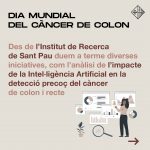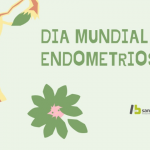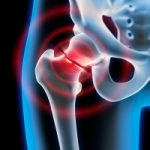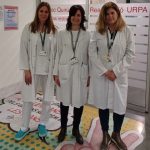
L’Institut de Recerca de l’Hospital de Sant Pau i la Santa Creu – IIB Sant Pau participa de manera molt activa en la recerca de malalties diferents malalties minoritàries. Entre ells, el Grup de Síndromes de reparació del DNA i predisposició al càncer i la Unitat Mixta de Recerca en Medicina Genòmica Sant Pau- UAB, dirigits pel Dr. Jordi Surrallés, estudien l’anèmia de Fanconi. Es tracta d’una malaltia que es caracteritza per presentar inestabilitat genòmica i una deficiència en la reparació de l’ADN, el que resulta en fragilitat cromosòmica.
Tal com explica el Dr. Surrallés, l’estudi de les malalties minoritàries no només ajuda a trobar solucions pels pacients que les pateixen, també “és un model de recerca molt útil per ajudar a buscar noves eines diagnòstiques i terapèutiques per altres malalties”.
Aquest expert fa una analogia que ajuda a entendre molt bé això: “Si ara vingués un extraterrestre i volgués entendre com funciona un cotxe, no tindria ni idea de per a què serveix cadascun dels elements. Si trenqués una peça del motor i comprovés quin efecte té, podria esbrinar la funció de la peça. Per exemple, si talla el conducte que porta l’aigua per netejar els vidres, ja sap la seva funció i pot tenir pistes de com poder arreglar-lo. A la majoria de pacients amb malalties rares els hi falta una peça, un gen, fent que el motor no funcioni i aparegui la malaltia”.
En aquest sentit, com a exemple, a finals de l’any aquest grup de recerca de Sant Pau va participar en un estudi internacional que es va publicar la revista Nature, que identificava el mecanisme pel qual els pacients amb anèmia de Fanconi desenvolupen tumors de cap i coll. Els investigadors van poder comprovar que és el mateix mecanisme que explica per què fumar i beure augmenten el risc d’aquest tipus de càncer en la població general.
En concret, l’estudi va trobar que la deficiència en el procés natural de les cèl·lules per reparar el dany que produeixen unes substàncies químiques que fan malbé l’ADN, anomenades aldehids, és la responsable del risc de presentar carcinoma de cèl·lules escamoses de cap i coll.
Les persones amb l’anèmia de Fanconi no tenen funcional un d’aquests sistemes de reparació, cosa que fa que les seves cèl·lules siguin incapaços d’eliminar les lesions creades per diferents factors ambientals.
“Aquests resultats ens ajuden a entendre els mecanismes implicats en l’origen d’aquest tipus de tumors i ens permeten buscar noves estratègies dirigides a intentar contrarestar aquest risc no només en els pacients amb anèmia de Fanconi, sinó també en la població general on la combinació de tabac i alcohol també eleva molt el risc de patir aquests tumors”, en paraules del Dr. Surrallés.
CADASIL
Sant Pau també és referent en la recerca del CADASIL. Es tracta d’una malaltia genètica associada a una mutació en el gen NOTCH3, que causa una arteriopatia sistèmica. Això vol dir que les artèries de tot el cos estan danyades, tot i que els símptomes que presenten els pacients son deguts a l’afectació dels vasos del sistema nerviós central, segons explica la Dra. Elena Muiño, del Grup de Farmacogenòmica i genètica neurovascular de l’Institut de Recerca de l’Hospital de la Santa Creu i Sant Pau – IIB Sant Pau, que dirigeix el Dr. Israel Fernández Cadenas.
Aquesta malaltia rara té una prevalença estimada de 4,1 casos per cada 100.000 habitants. Tot i això, els darrers estudis revelen que fins a 3,2-3,4 de cada 1.000 individus presenten les variants gèniques típiques de CADASIL, de manera que es pensa que podria estar infradiagnosticada. Els seus principals símptomes són la migranya, les alteracions psiquiàtriques, els petits infarts subcorticals recurrents i la demència a una edat precoç, amb una edat mitjana d’inici als 55 anys.
Un dels principals reptes davant d’aquesta malaltia és que “no podem predir com evolucionarà un pacient a causa de la seva alta variabilitat”, comenta la Dra. Muiño que detalla que a Sant Pau s’està estudiant l’etiopatogènesi de la malaltia, és a dir, el perquè es produeix la malaltia amb l’objectiu de trobar molècules rellevants tant per poder predir l’evolució dels pacients com per intentar trobar noves dianes terapèutiques.
Gràcies a l’estreta col·laboració de l’Associació CADASIL Espanya i als pacients voluntaris en els nostres estudis, s’han pogut fer troballes importants, com ara que el gen E2F4 està sobreexpressat en pacients amb CADASIL, el que s’associa a una pitjor funció executiva.
“La nostra ambició en aquesta línia de recerca és millorar la qualitat de vida dels pacients amb CADASIL. Per tant, també tenim una consulta monogràfica des del 2019 a l’Hospital de la Santa Creu i Sant Pau, que des del 2022 compta amb el suport de professionals altament qualificats per a la realització d’anàlisi i consells genètics, neuroimatge, acompanyament psiquiàtric i neuropsicològic entre d’altres”, conclou la Dra. Muiño.
Malalties de la Hipòfisi
La Dra. Susan Webb, directora del grup de recerca de Malalties de la Hipòfisi, de l’Institut de Recerca de Sant Pau, ha rebut recentment el reconeixement per part de la Comissió Gestora de la Plataforma de Malalties Minoritàries a la seva trajectòria i compromís professional a favor d’aquest tipus de patologies.
El reconeixement destaca la seva contribució a difondre, conscienciar i afavorir la recerca en l’àmbit de les Malalties Minoritàries. La Dra. Webb actualment és catedràtica emèrita de Medicina a la UAB i és sotsdirectora científica de CIBERER, presidenta de la Comissió Assessora de Malalties Minoritàries del CatSalut (CAMM) i va ser responsable d’un Working Package de l’EndoERN (Xarxa Europea de Malalties Minoritàries Endocrines), concretament de “Quality of Care and Patient View”.
Aquest grup de recerca investiga en diferents malalties hipofisiàries com ara la síndrome de Cushing, l’acromegàlia o l’hipopituïtarisme, incloent-hi el dèficit de vasopressina i oxitocina. Segons explica la Dra. Webb, un dels principals problemes amb aquestes malalties és que, malgrat aconseguir normalitzar les disfuncions hipofisiàries sigui amb cirurgia o amb tractament mèdic, les seqüeles derivades de l’exposició a nivells inadequats de determinades hormones pot deixar seqüeles tant físiques com psicològiques.
“Molts cops curem al pacient de la seva malaltia, però veiem que aquests pacients segueixen tenint problemes com disfunció muscular, osteoporosis, ansietat o depressió. També poden percebre una reducció de la memòria i de la capacitat executiva”, detalla la Dra. Webb.
Un dels principals reptes, doncs, en aquestes patologies és el diagnòstic precoç, ja que a vegades pot arribar a trigar anys. “Quan un pacient arriba a l’endocrí és relativament fàcil diagnosticar-lo, però necessitem que des de l’atenció primària i altres especialitats hi hagi la sospita i la derivació pertinent, per tant, es tracta d’un repte multidisciplinari”, finalitza la Dra. Webb.
Sant Pau, un hospital referent en malalties minoritàries
Sant Pau ha estat pioner en l’abordatge multidisciplinari de les malalties minoritàries impulsant la creació de diferents Comissions i Unitats, com per exemple la primera Unitat multidisciplinària a l’Estat espanyol per al tractament de l’Esclerosi Lateral Amiotròfica (ELA). Totes aquestes Comissions i Unitats inclouen professionals de diferents Serveis i perfils. Entre ells destaca la infermera gestora de casos de Sant Pau, una figura que gràcies a la seva gran autonomia dins l’estructura de l’Hospital i a la seva accessibilitat és un referent per als pacients amb malalties minoritàries i les seves famílies.
L’Hospital de Sant Pau organitza avui la jornada “Les malalties rares són cosa de tots”, destinada a sensibilitzar els professionals assistencials sobre les malalties minoritàries, amb l’objectiu de potenciar la visibilitat d’aquestes patologies. Aquesta jornada és un exemple més de l’enfocament multidisciplinari pel qual aposta Sant Pau. Al llarg del dia, es compartiran casos clínics per sensibilitzar els professionals de l’Hospital, formar-los i fer que comparteixin coneixements entre ells, per millorar el diagnòstic i l’abordatge.
La Dra. Susanna Boronat, directora del Servei de Pediatria de Sant Pau, afirma que “aquest enfocament és fonamental en un centre terciari com el nostre que fa activitat assistencial, docent i de recerca”, i afegeix que “la jornada serveix per a conscienciar especialment sobre tres temes: primer, que el cost de no diagnosticar una malaltia minoritària cada cop és més alt; segon, que tots els especialistes poden trobar-se amb un d’aquests pacients i contribuir a un millor diagnòstic i abordatge; i, tercer, que les malalties minoritàries poden afectar pacients de totes les edats, no només a infants”.
En la mateixa línia s’expressa el Dr. Diego Castillo, responsable de les malalties pulmonars intersticials difoses del Servei de Pneumologia i Al·lèrgia de Sant Pau. “Cal aprofitar dates com el Dia Mundial de les Malalties Minoritàries per conscienciar sobre la necessitat de compartir el coneixement en diagnòstic i tractament entre totes les Unitats i Serveis de l’Hospital”.
Tots dos experts coincideixen a l’hora de fer èmfasi en la importància de potenciar les relacions amb les associacions de pacients i familiars. Segons la Dra. Boronat, “és essencial anar de la seva mà, perquè moltes vegades són elles qui ens ajuden a saber com és viure realment amb una malaltia minoritària”. Per la seva banda, el Dr. Castillo destaca que “un tret diferencial que sempre ha tingut Sant Pau és l’humanisme, és a dir, oferir una assistència que acompanya els malalts i les seves famílies en aquest viatge”.
En aquest sentit, destaca la infermera gestora de casos, la funció principal de la qual és unificar les cures dels pacients de manera individualitzada. “Es tracta de facilitar al pacient l’accés als serveis sanitaris i sociosanitaris segons quines siguin les seves necessitats en cada moment i segons l’evolució de la malaltia per garantir que rep l’atenció més adequada”. D’aquesta manera, tenen un accés directe mitjançant telèfon, visites virtuals i presencials a consultes externes i hospitalització i correu electrònic”, explica l’Anna Alonso, infermera gestora de casos de Sant Pau. També subratlla la seva accessibilitat i autonomia en el seguiment del pacient i la presa de decisions “treballant de manera multidisciplinària en coordinació amb els diferents Serveis”.
Xarxes europees
L’Hospital de Sant Pau participa en les European Reference Networks (ERN) com a centre altament qualificat en el diagnòstic, el tractament i la recerca en les malalties minoritàries. Les ERN són xarxes de referència europees que ajuden els professionals i els centres especialitzats en diferents països a compartir coneixement. En aquest sentit, han d’aplicar els criteris de la Unió Europea (UE) per fer front a les malalties minoritàries que requereixen atenció especialitzada; servir com a centres de recerca i de coneixement que tracten pacients d’altres països de la UE i assegurar la disponibilitat d’instal·lacions de tractament quan sigui necessari. Actualment, Sant Pau participa en:
- ERN, European Commission
- Rare adult càncers
- Rare neuromuscular diseases
Sant Pau també està acreditat en la xarxa de Centres, Serveis i Unitats de Referència del Sistema Nacional de Salut (CSUR) del Ministeri de Sanitat en diferents grups de malalties minoritàries, i és membre destacat de les Xarxes d’unitats d’expertesa clínica (XUEC) en Malalties Minoritàries del Servei Català de la Salut.
De fet, recentment, la Unitat Transversal d’Epilèpsia Sant Pau – Mar -que va iniciar la seva activitat a finals de l’any 2020- va ser designada unitat d’expertesa clínica en malalties minoritàries amb epilèpsia pel Departament de Salut, “esdevenint una de les quatre que avui estan reconegudes com a centres de referència en aquesta patologia”, explica la Dra. Boronat. Aquesta Unitat també és Centre de Referència Nacional de Salut (CSUR) i forma part de la Xarxa Europea de Referència (ERN) en epilèpsia, sent un referent per a pacients pediàtrics i adults en malalties genètiques amb epilèpsia, epilèpsies estructurals i altres tipus d’epilèpsia.
A més, Sant Pau és centre de referència en:
- Malalties de la sang – Trasplantament de progenitors hematopoètics al·logènics, en nens. CSUR
- Malalties neuromusculars rares, en adults. CSUR, XUEC, ERN.
- Sarcomes i altres tumors muscoesquelètics, en adults. CSUR, ERN.
- Extròfia vesical, epispadias i extròfia de claveguera, en nens i adults. CSUR.
- Malalties glomerulars complexes, en nens i adults. CSUR, XUEC, ERN.
- Eritropatologia hereditària, en nens i adults. CSUR, ERN.
- Patologia complexa hipotàlem-hipofisària, en nens i adults. CSUR, XUEC, ERN.
- Malalties Autoimmunes sistèmiques. XUEC.
- Epilèpsia/MM, en nens i adults. CSUR, XUEC.
I també forma part de la Plataforma Malalties Minoritàries, una entitat pertanyent a l’Institut Català de la Salut (ICS) nascuda l’any 2009 quan l’Àrea de Malalties Minoritàries creada uns anys abans (el 2000) per la Fundació Doctor Robert – UAB va dotar-se d’identitat pròpia amb l’objectiu de donar més visibilitat a les malalties minoritàries, crear sinergies que facilitin el seu reconeixement a l’àmbit sociosanitari i generar un espai de treball conjunt entre tots els agents implicats.





















